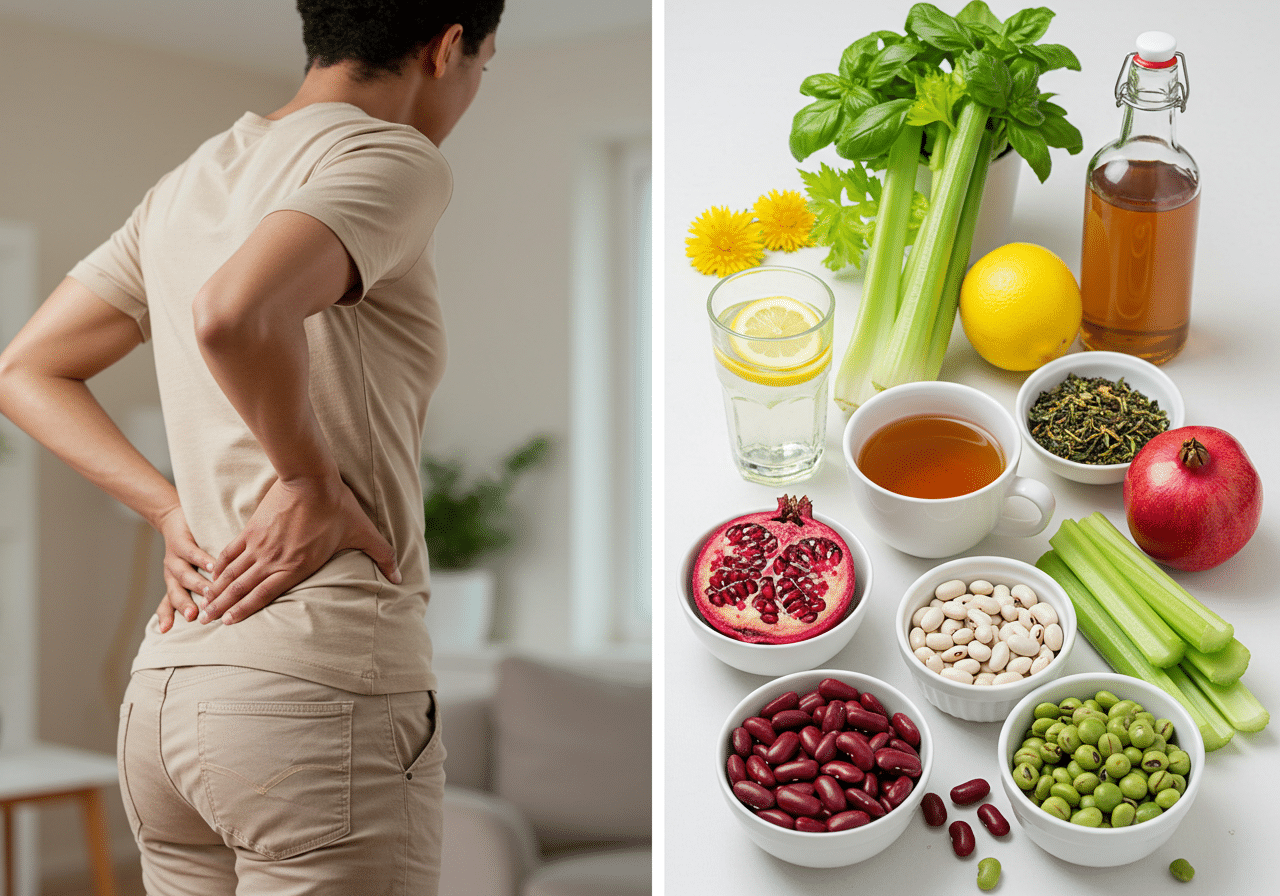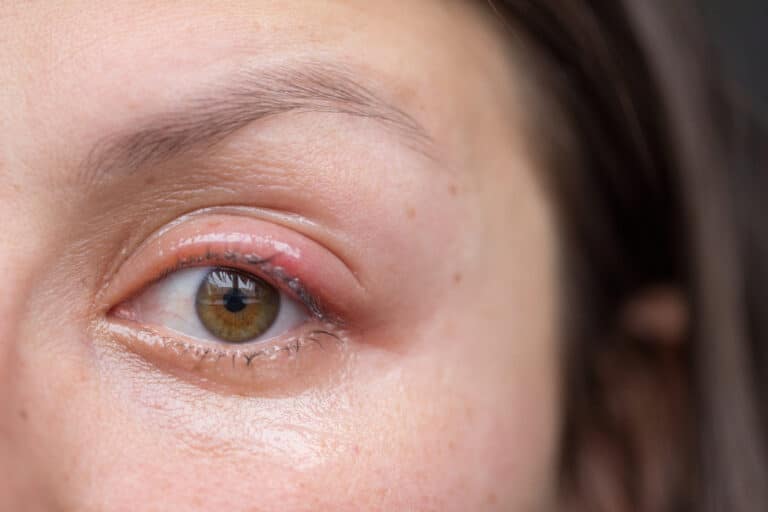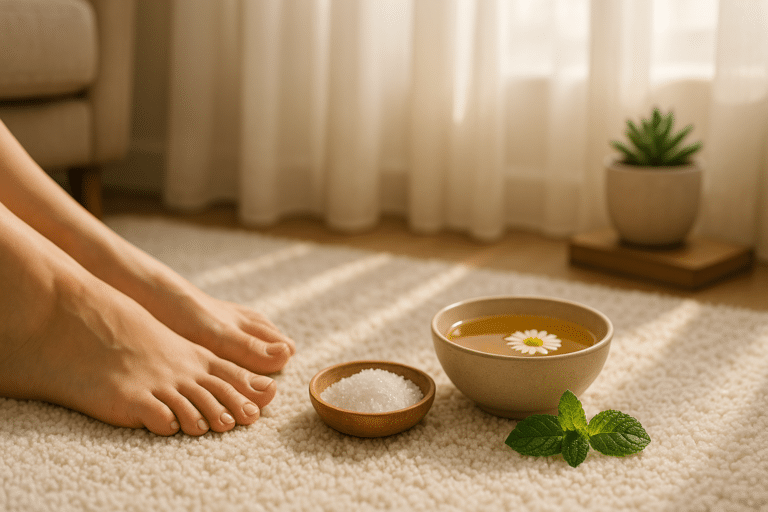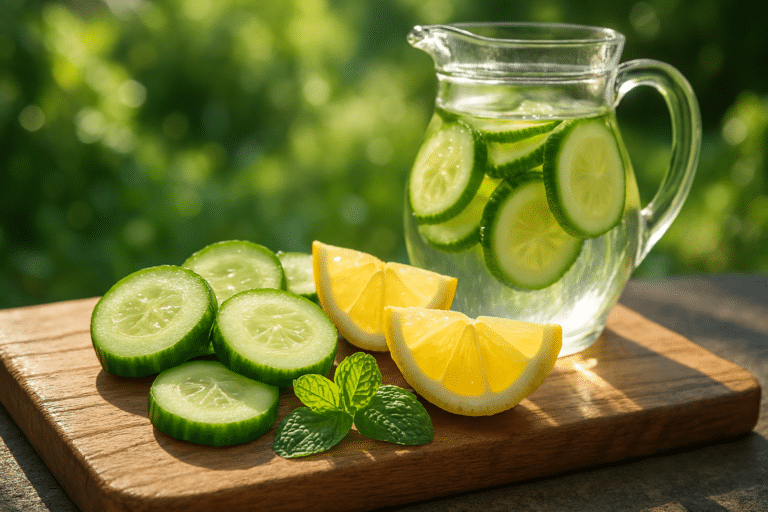7 Effective Kidney Stone Remedies You Can Try at Home

If you’ve ever dealt with kidney stones, you know how uncomfortable they can be. Fortunately, there are several effective remedies you can try at home to manage the situation better. From adjusting your diet to incorporating specific fluids, simple changes can make a significant difference. But what exactly should you focus on? Let’s explore some practical strategies that may help alleviate your discomfort and promote kidney health.
Hydration and Fluids
When it comes to preventing kidney stones, staying hydrated is vital. Aim for at least 2 liters (8 cups) of water daily, with 3 liters (12 cups) being ideal. This helps guarantee a urine output of over 2 liters, which greatly reduces stone formation risk. Drinking enough water can help prevent crystal clumping in urine, which is essential for reducing the likelihood of stone development. Additionally, proper hydration is crucial for maintaining optimal health, as it regulates body temperature and transports nutrients.
Drink water regularly, especially in hot weather, to maintain hydration. While fruit juices can be beneficial, like grapefruit and orange juice for lowering stone risk, avoid cranberry juice as it can increase saturation levels.
Stick to low-calcium fluids to further decrease risks. By diluting urine, adequate hydration supports overall kidney health and can alleviate pain associated with passing stones.
Acidic Remedies
When it comes to acidic remedies for kidney stones, lemon juice stands out for its citric acid content, which can help prevent stone formation. Apple cider vinegar also shows promise, though more research is needed to confirm its effectiveness. Additionally, pomegranate juice offers unique properties that may support kidney health, making it worth considering in your regimen. Incorporating high water intake into your daily routine can further help dilute stone-forming substances in urine.
Lemon Juice Benefits
Lemon juice offers a natural and effective way to combat kidney stones, thanks to its high citric acid content. Incorporating lemon juice into your daily routine can provide several benefits:
- Increases Citrate Levels: Helps raise citrate levels in urine, inhibiting stone formation.
- Reduces Urine pH: Lowers urine acidity, making it less conducive to stone development. This is particularly important because kidney stones develop when substances like calcium and oxalate concentrate in the kidneys.
- Cost-Effective: Often cheaper and more accessible than pharmaceutical alternatives like potassium citrate.
- Prevents Calcium Oxalate Stones: Particularly effective against the most common type of kidney stones.
Apple Cider Vinegar
Apple cider vinegar (ACV) is gaining popularity as a natural remedy for kidney stones due to its unique acidic properties. Its acetic acid content is believed to soften and break down stones, potentially reducing their size and making them easier to pass. Solid masses of crystalized minerals in the kidneys can result from a buildup of minerals in concentrated urine, which is where ACV may play a beneficial role.
Many people find that adding diluted ACV to their diet may help prevent new stones from forming by altering urinary chemistry. While anecdotal evidence and a few studies support its benefits, more research is needed for a definitive conclusion.
Remember to use raw, organic, unfiltered ACV for the best results, and always dilute it to avoid excessive acidity. Staying well-hydrated is essential when trying this remedy to guarantee kidney stones pass smoothly.
Pomegranate Juice Properties
Pomegranate juice stands out as another natural remedy for kidney stones, offering a unique blend of beneficial properties. Its chemical composition includes powerful phytochemicals that support kidney health.
Here’s what you can expect from this juice:
- Antioxidant Effects: Protects your cells from oxidative stress.
- Urine Acidity Reduction: Helps lower urine acidity, potentially preventing stone formation.
- Muscle Relaxation: May relax urinary tract muscles, aiding in stone passage.
- Inflammation Reduction: Its anti-inflammatory properties can ease discomfort. Additionally, pomegranate juice is high in potassium, which can be beneficial for those looking to maintain proper electrolyte balance while managing kidney health.
Integrating pomegranate juice into your routine can be a delicious way to support kidney function and potentially alleviate kidney stone issues.
Just remember to enjoy it in moderation and consult your healthcare provider if you have any concerns.
Dietary Changes
To manage kidney stones, it’s essential to limit oxalate-rich foods like spinach and chocolate. Increasing your potassium intake through fruits and vegetables can also help, as potassium aids in balancing minerals in your body. Additionally, staying hydrated by drinking plenty of water can further reduce your risk of stone formation. Making these dietary changes can greatly reduce your risk of stone formation.
Limit Oxalate-Rich Foods
While it’s challenging to completely eliminate high-oxalate foods from your diet, limiting their intake can greatly lower your risk of kidney stone formation.
To help manage your oxalate levels, consider reducing the following foods:
- Leafy greens like spinach and rhubarb, which are very high in oxalates.
- Nuts and seeds, particularly almonds and cashews that contain significant amounts.
- Root vegetables such as beets and baked potatoes with skin.
- Legumes like navy beans and soybeans, known for their oxalate content. Additionally, pairing calcium-rich foods with oxalate-rich foods can help prevent stone formation.
Increase Potassium Intake
Increasing your potassium intake can play an essential role in preventing kidney stones. A potassium-rich diet helps reduce the risk of stone formation by binding calcium in your intestines and urine. Research indicates that higher dietary intake of calcium may also prevent both first-time and recurrent kidney stones.
Include foods like bananas, cantaloupe, potatoes, spinach, and avocados in your meals. Beans, lentils, almonds, and fortified plant-based milk also offer great sources of potassium. By increasing your potassium intake, you lower calcium concentration in urine and consequently, the risk of developing kidney stones. Pair this with adequate calcium and fluid intake, and consider reducing caffeine.
Remember to consult your healthcare provider before making significant changes and monitor your kidney health regularly. Consistency in maintaining a potassium-rich diet is key for long-term prevention.
Herbal Remedies
When seeking relief from kidney stones, you might consider herbal remedies as a natural option. These herbs can help ease discomfort and support kidney health. Here are some effective choices:
- Marshmallow: Soothes the urinary tract with its demulcent properties.
- Couch Grass: Acts as a diuretic and antibacterial, promoting urine flow.
- Goldenrod: Exhibits antilithic properties to help dissolve stones and increase diuresis.
- Chanca-piedra: Known as “stone-breaker,” it reduces crystal formation and prevents stone growth. Additionally, maintaining proper hydration is essential to aid in passing kidney stones effectively.
To use these herbs, prepare teas by boiling water, adding the herbs, steeping, and straining. Aim for 2-4 cups daily, but consult a healthcare professional before starting any herbal remedy, especially if you’re on medications.
Weight Management
Maintaining a healthy weight is essential for reducing the risk of kidney stones, as excess body weight can lead to metabolic changes that promote stone formation. Obesity increases your likelihood of developing both uric acid and calcium oxalate stones. By managing your weight, you can improve your metabolic health and reduce inflammation, which are vital for lowering kidney stone risk.
Weight loss can decrease urinary oxalate levels and help normalize urine pH, making it less acidic and less favorable for stone formation. Additionally, higher kidney stone risk is associated with metabolic dysfunction and obesity, emphasizing the importance of weight management. Adopting a balanced diet and engaging in regular exercise can support your weight management efforts.
Medical Considerations
While exploring kidney stone remedies, it’s vital to contemplate medical factors that could affect your approach.
Before trying any home remedy, consider the following:
- Consult a Doctor: Always check with a healthcare professional, especially if you have pre-existing conditions or take medications.
- Identify Stone Type: Understand the type of kidney stone you have, as remedies may vary in effectiveness. Knowing the stone type is crucial for preventing kidney stones through targeted dietary changes.
- Account for Risk Factors: Be cautious if you have kidney or heart disease, as some remedies could interact negatively.
- Pregnancy and Breastfeeding: Avoid home remedies during these times unless approved by your doctor.
Taking these medical considerations into account can help guarantee your safety and the effectiveness of your chosen remedies.
Lifestyle Modifications
To effectively reduce your risk of kidney stones, making lifestyle modifications is essential.
Start by drinking at least 2 liters of water daily, ideally 3 liters, especially in hot weather, to dilute your urine. Incorporate citrus juices like lemon or lime, which contain citrate that helps block stone formation. Drinking plenty of water is crucial to prevent concentrated urine, which can lead to crystal formation.
Limit your sodium intake to 2,300 milligrams daily and consume calcium-rich foods to prevent oxalate stones. Regular physical activity keeps your bones strong and helps maintain a healthy weight, vital for kidney health.
Also, monitor your alcohol and caffeine consumption, as they can lead to dehydration.
Frequently Asked Questions
Can Kidney Stones Be Passed Naturally Without Medical Intervention?
Yes, kidney stones can often pass naturally without medical intervention. If your stones are small and located in the right area, staying hydrated and managing pain can help ease the process. Monitor your symptoms closely.
What Are the Symptoms Indicating a Kidney Stone Emergency?
If you’re experiencing severe pain, bloody or cloudy urine, burning sensations during urination, and persistent nausea or fever, it’s essential you seek immediate medical attention. These symptoms might indicate a kidney stone emergency.
Is There a Specific Diet for Different Types of Kidney Stones?
Yes, there’s a specific diet for different kidney stone types. You should increase calcium for calcium oxalate stones, limit purines for uric acid stones, and stay hydrated. Each type requires tailored dietary adjustments for prevention.
How Long Does It Take to Pass a Kidney Stone?
It can take varying times to pass a kidney stone. Small stones usually pass within 31 days, while medium stones might take around 45 days, and larger stones could take up to 12 months without medical help.
Are There Any Long-Term Effects of Having Kidney Stones?
Yes, having kidney stones can lead to long-term effects like chronic kidney disease, recurrent stones, and increased pain. It’s essential to manage them properly to avoid complications and protect your overall kidney health.
Conclusion
To sum up, managing kidney stones at home is possible with these effective remedies. By staying hydrated, incorporating acidic foods, and making smart dietary changes, you can support your kidney health. Don’t forget about herbal remedies and maintaining a healthy weight, as they play a significant role too. Always keep in mind to consult your healthcare provider before making any changes. With these strategies, you can take charge of your kidney stone prevention and promote overall wellness.
References
- https://www.healthline.com/health/kidney-health/home-remedies-for-kidney-stones
- https://www.healthline.com/nutrition/kidney-stone-remedies
- https://www.medicalnewstoday.com/articles/319418
- https://www.mountsinai.org/health-library/selfcare-instructions/kidney-stones-self-care
- https://urologistahmedabad.com/home-remedies-for-kidney-stones/
- https://pmc.ncbi.nlm.nih.gov/articles/PMC7731957/
- https://www.utsouthwestern.edu/newsroom/articles/year-2023/june-prevent-kidney-stones.html
- https://www.aafp.org/pubs/afp/issues/2019/0415/p490.html
- https://medicalhousecalls.com/kidney-stone-iv-fluids/
- https://medicalupdate.pennstatehealth.org/urology-surgery/hydration-increase-research-0824/






